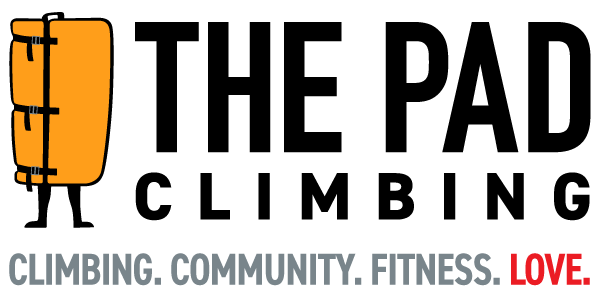Why Culture Matters to Us
Culture it is the foundation of what our members, employers, and vendors can expect from us. As a 24/7 trust space staffed with folks who often times don’t have a manager on shift, there are always times when a decision has to be made in the moment – and culture is what makes it a good choice that we can back up when called to do so.
This is what you can expect from The Pad Climbing, its members, its employees, and its partners.
MISSION
To build immersive, self-reliant and interdependent experiences, spaces, and opportunities through climbing, community, fitness, and love.
GOALS
- Iterate efficiency and profitability to support employee first environment
- The facility must be both safe and attractive
- Creative, progressive, and fun route offerings for the diverse needs of our climbing community
- Create programs that foster environmental sustainability, equity, and proximity to our services
OUR FACILITIES
Are community focused, not recreational focused
Have a clear aesthetic that provides accessibility for whatever level you’re at and inspires internal intrinsic improvement
Have a blend of approachability, delight, strong use of space, and integration of new and experienced climbers
Provide fun, educational, and healthful spaces for the area’s youth
Provide a hub for the climbing community’s activities
THE PADDIE

The image itself is of a bouldering crashpad from behind with the person’s legs sticking out as they wear it like a backpack
It’s a symbol that’s both distinct and unclear to those who are not on the inside, and very clear and fun to those on the inside
It reflects our bouldering-only community heritage
Its cartoonish drawing style reflects our design and business philosophy: clean, intentional, but playful
COMMITMENT TO INCLUSION
To us, inclusion means inclusion without exception.
All climbing is all good; all climbers are all good.
The Pad has always been committed to giving access to anyone who wishes it and will uphold the values of the organization, making it a safe and inclusive space for all. We believe that inclusion happens by ignoring the exclusive and cliquish mindset that can occur upon adopting a new pursuit, with all the lingo and signaling that come with it.
We are committed to the following authentic leadership goals:
leading with respect and tolerance and expect everyone in our organization to do the same, including our customers.
systematically expunging from our vocabularies noninclusive and gate keeping language, explaining climbing terms when used, and making entry into the community as easy as possible.
hearing and representing all individuals, no matter their affinity, spiritual and political beliefs, so long as they maintain a safe space for others.
avoiding performative acts and being consistent with our values as transparently as possible.
ongoing education and discussion about how to achieve these goals, always paying attention to, and amplifying the voices that need to be heard and committing to amplifying them.
partnering with other organizations to enable these efforts to access more in our community than those we currently serve.
We are committed to the following workplace leadership:
upon discovery, acknowledging and working to dismantle any inequities within our policies, systems, programs and services.
ensuring our hiring practices reflect our values, positioning ourselves in front of underrepresented populations, including felons, veterans, LGBTQIA+, low income, those with disabilities, and people of color as a place to potentially make a work home. And we are committed to helping them reframe the space in order to do that.
ongoing education for staff on identifying unconscious bias and sharing equitable and cultural diversity experiences and practices as they relate to our workplace and community.
COMMITMENT TO EMPLOYEES
We strive to hire people we’ll support long term, even if that means they leave us for new experiences. We believe in your potential and that you are inherently an important balance to the team. As long as employees demonstrate resilience to constructive criticism and a desire to learn and improve, we are committed to you.
We will provide training and skill building opportunities at all times and by request.
Address issues as soon as they see them with their peers.
If resolution is not immediate and sincere, supervisors should be notified.
If resolution is not immediate and sincere with a supervisor, peers should go up the chain.
Feedback/Conflict
Feedback should be offered as soon as it is observed. You are ready to give feedback if:
You can sit next to the person instead of across from them
You can put the problem in front of, rather than between, you guys
You are ready to listen, ask questions, and accept that you may not fully understand the issue
You are ready to acknowledge what you do well instead of just see mistakes
You recognize strengths and how to use them to address challenges
You can hold someone accountable without blaming or shaming
You can own your part
You can genuinely thank the person for their efforts
You can think about resolving challenges to lead to growth and opportunity
You can model vulnerability and openness that you want from the other party.
We are to say in a private, appropriate space, “Hey, would you be open to feedback?”
Accept the answer “no.” Try again at another time. If “no” is constant, address with supervisor. If you are 100% certain that the person is trying the best they can and will not be able to improve, it’s time to recognize that they may not be a fit.
Ask questions before you offer feedback in objective terms, unemotionally – do not offer it until you can. If someone is late, say “You’re late, what is causing this?” You don’t need to offer feelings or reasons why that’s a problem. People know. Be specific and clear. Follow the formula: SBI – situation, behavior, impact
If you cannot process the information, it is okay to circle back the next day. Often a day’s space removes anxiety and emotional consequences.
How can you receive difficult feedback?
Think about how you would want your favorite younger person to see you react.
Acknowledge the feedback giver’s feelings/opinion, and it’s okay to acknowledge that you need a break or are defensive.
Delegation
The team comes first – if you are not building up your teammates, you’re tearing the whole organization down.
Supervisors should give opportunities to their directs to improve, learn, and gain additional responsibility as they demonstrate capacity and desire.
Supervisors should always design programs and operations as facilitators and not cornerstones.
Self-actualization
Climbing and community: it can’t be great unless you work on you
If you are upset or finding gossip, ask yourself what story you are experiencing and if that is true, or something you tell yourself
What do you need to learn to understand the situation?
What do I need to do to understand others?
We model BRAVING:
Boundaries: Respect each other’s boundaries, and when not clear, ask. You can say no.
Reliability: You do what you’ll say you do.
Accountability: you own your mistakes, apologize, and make amends
Vault: you do not share info that’s not yours to share. Confidences are kept for the health of the team, community, and organization
Integrity: Courage over comfort
Nonjudgement: Ask for what you need, and we can talk about how we feel. Ask for help.
Generocity: Give the most generous interpretation of intentions, words, and behaviors.
Understand your core values and stay true to your top 5. (You can take this test and find out what they are – communicating results to your team is encouraged) – if your position or this company challenges them, you may not be a fit and long term happy. Address that!
Kaizen!
Just like climbing – we believe in improvement through daily practice and improvement. Looking to improve how we do things means that we will always be ahead of the curve.
Ask yourself two questions constantly:
Is this the highest and best use of my time?
If it is not, then how do I do it for the last time?
We support delegation and efficient use of time. Solving a repetitive issue or handing off a task you’re not suited for will make you happier, us more money, and the organization stronger.



